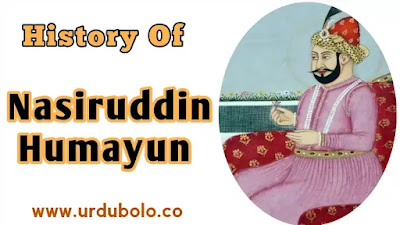Nasir ud din Muhammad Humayun Period (1530 – 1556) :
Although Humayun Khan was declared the ruler before the death of his father, with the death of Zahiruddin Muhammed Khan, other brothers began to struggle for the sultanate and the Mughal Empire entered the Interregnum period. During the reign of Zahiruddin Muhammed Khan, the heirs of the sultanate, who became an independent power with the armies given to their orders by giving them governor ships, declared that they did not recognize the reign of their elder brother Humayun Khan, despite the will of their father, relying on the power in their hands. Humayun Khan, who had difficulty in fighting with his brothers who joined forces by agreeing with each other, had to give his brothers large lands and concessions.
This internal conflict in the Mughal Empire, It meant undermining his authority. Desiring to take advantage of this situation, local Indian kingdoms and landowning princes called rajas formed alliances and began to attack the Mughal Empire. When the Afghan Emirates and the Ludi rule, which was defeated during the reign of Zahiruddin Muhammed Khan, became involved in these attacks, the Mughal Empire vengeance was attacked from the front. Despite the difficult situation he was in, Humayun Khan suppressed rebellion movements and attacks and eliminated all external threats without losing territory. However, internal threats continued. Military Khan, the governor of Gujarat, one of his brothers, with whom he struggled for the sultanate, marched on Agra to gain more privileges and expand his dominance. Humayun Khan, who had difficulty in fighting this attack, restored the peace by giving his brother large lands and additional privileges from the Agra region, but this move of Military Khan paved the way for the attacks of other brothers who wanted concessions and land, and led to an increase in the cases of Interregnum.
The emerging internal and external threats were somehow eliminated, but they were not stopped because no definite results could be obtained. The defeated Ludi Kingdom weakened, and Shir Khan, the deposed ruler of the Sur State, which was wanted to be established in its place, attacked Agra at night in order to regain the lost Agra lands during the reign of Ibrahim Ludi. Humayun Khan sought help from his brothers, the heir to the sultanate, against the unexpected attack of Shir Khan, but had to take refuge in the Safavid ruler Tahmasp because they did not support him. Şir Han had made an agreement with the Ottoman Empire and cooperated to overthrow the Safavid Empire. Being aware of this situation, Tahmasp supported Humayun Khan and attacked Shir Khan with his armies, and Kabul, Kandahar, He defeated the armies of Shir Khan, who had besieged the cities of Bedahshan, and took these cities back. However, this alliance between Humayun Khan and Tahmasp did not last long. Because the Safavid State was ostracized by the Islamic world because of their belonging to the Shiite belief.
Humayun Khan, who wanted to cooperate with the Ottoman Empire instead of acting together with the Safavid State due to the religious conflict, sent a letter to Suleiman the Magnificent by addressing him as "Padişah Baba" in order to form an alliance against the Safavid State. However, he received no reply to this letter. Humayun Khan, who wanted to cooperate with the Ottoman Empire instead of acting together with the Safavid State due to the religious conflict, sent a letter to Suleiman the Magnificent by addressing him as "Padişah Baba" in order to form an alliance against the Safavid State. However, he received no reply to this letter. Humayun Khan, who wanted to cooperate with the Ottoman Empire instead of acting together with the Safavid State due to the religious conflict, sent a letter to Suleiman the Magnificent by addressing him as "Padişah Baba" in order to form an alliance against the Safavid State. However, he received no reply to this letter.
Humayun Khan continued to struggle politically with his brothers by maintaining his reign in the following years. Sher Khan was defeated, the Indian Kingdoms were repelled, and the Afghan offensive was left inconclusive. Humayun Khan, who fulfilled his duty to a great extent, fell and was injured while trying to buy a book on the upper shelves in his library, and had a severe accident and could not regain his former health (1556). At the same time, upon the advice of the Ottoman Captain Derya Seydi Ali Reis, who came to visit him, he sent a letter to his son Akbar, who was fighting with the Afghans in Bedahşah, and appointed him crown prince. When Humayun Khan died, Akbar Shah was still fighting. Akbar Shah, who returned after winning the battle of Bedahshah, learned that his father had passed away and took the throne and became the ruler of the Mughal Empire.










No comments:
Post a Comment
Please Avoid To Enter Spam Links in the Comment Box.